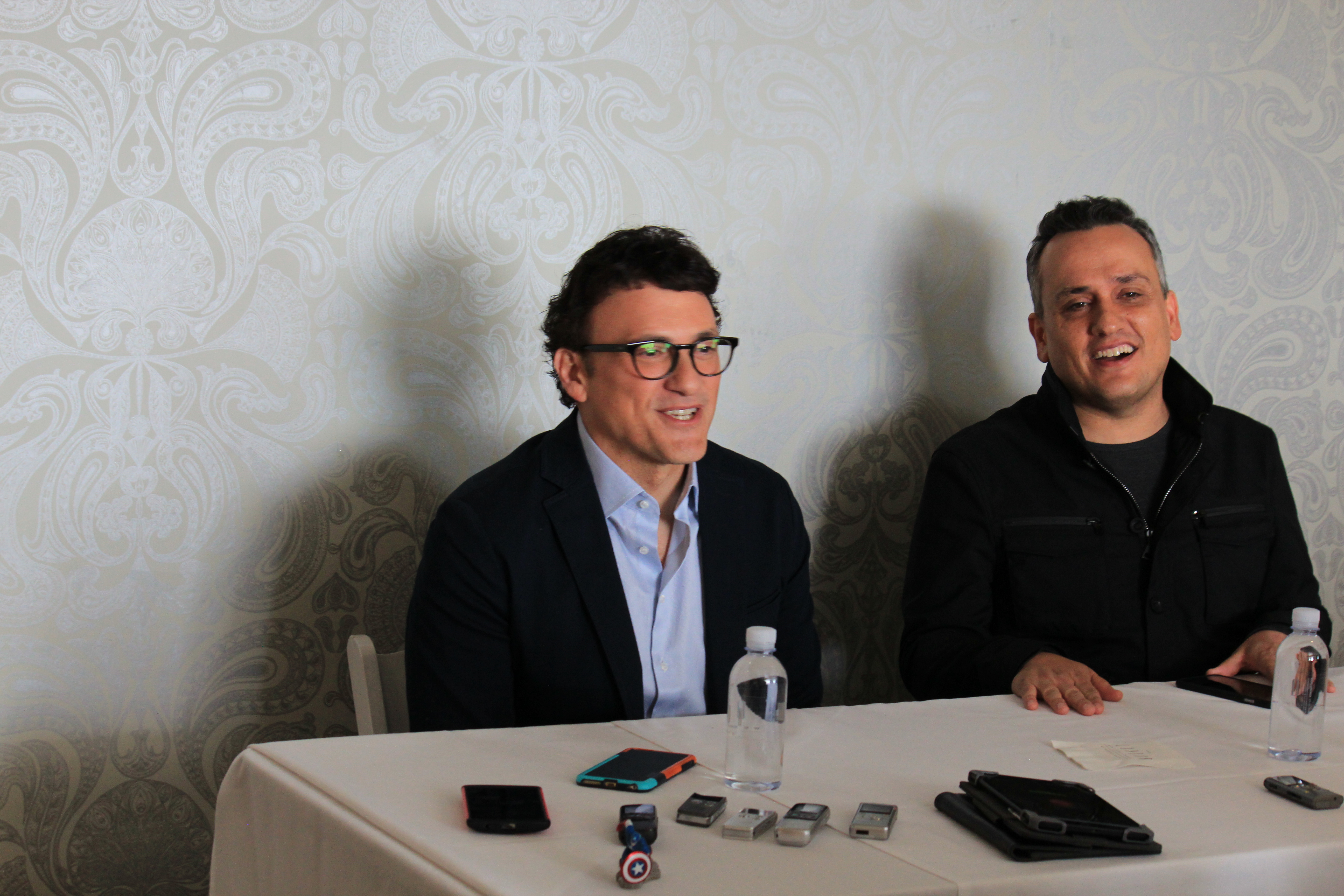
Anthony and Joe Russo are quite the directing duo. With their 2nd Captain America movie coming out this weekend, there are lots of questions surrounding the next chapter of the Marvel Universe. The brothers have teamed up once again but this time with a little darker storyline.

Photo Credit: Coralie Seright / LoveBugsAndPostcards.com
Captain America: Civil War has a Team Cap and a Team Iron Man. When the time came for the interview with the two during the Captain America Event, it was evident to see that the rival they have caused is by no accident. They wanted to know immediately which side we all took. We the group was split 50/50.
Directors Anthony and Joe Russo Talk Captain America
Anthony: How’s it going?
Joe: Did everybody get to see the movie?
He got an enthusiastic YES in unison.
Joe: Team Cap or team Ironman? By a show of hands.
Anthony: Wait, do it one more time. Ironman? Oh, wow, Cap? Oh my gosh!
Joe: That’s what we were hoping for. That was the intent with the film was to hopefully when you’re done watching a movie you leave the theater, and you argue with your family and friends about –- [INTERVIEWER OVERLAP]. We didn’t want to make a declarative statement one way or the other. We just want to represent both as accurately and emotionally as we could. We get out of the theater, and it’s more fun that way. It’s not the kind of story that the directors need to be too firm with their point of view and because I think it would close off the opportunity to have a conversation after the movie.
Was there any rivalry between you guys writing the script and thinking out the process of the movie between Captain and Ironman?
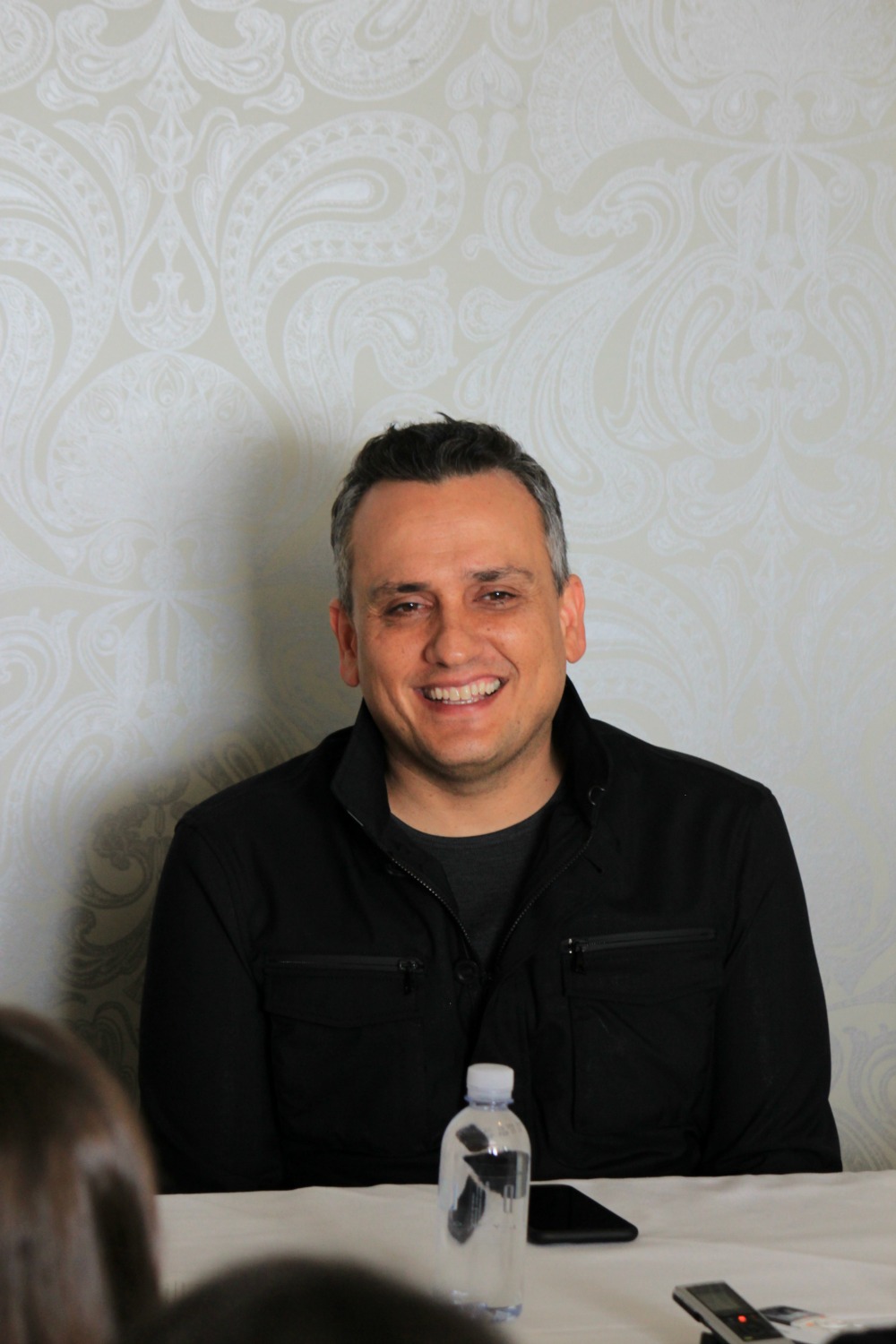
Anthony: No, I don’t think there was rivalry just because we both love both characters. We like very layered storytelling so we often when we’re breaking the story or prepping a movie, we’ll sort of step through the story from different characters points of view. We’ll take a pass where it’ll just be all about this character. And then we’ll take a pass where it’ll be all about that character. We work with ensembles. And so it’s become part of our process to have real moments where the whole movie belongs to somebody else, just one particular character for a moment as we’re thinking about the film from beginning to end. So, I think that’s the process we went through on this movie as well with the writers, Markus and McFeely and the producer Nate Moore from Marvel and Kevin Feige. They’re both very near and dear to our hearts. We love them both. The thing about Joe and I is that we love characters who are exciting and fun and cool at all that but also are very human and vulnerable. We always look for that side of the character. So for us, it was very important to find where’s Steve Rogers vulnerable? Where is Tony Stark vulnerable? And sort of play to those in this movie in a way that would put them in conflict with one another.
Spider-Man is fantastic in the movie, where did you find him and are you going to hold onto that kid?
Joe: Oh my God, we are doing everything we can to hang onto him.
Anthony: Yeah. We’re more in love with him than anybody.
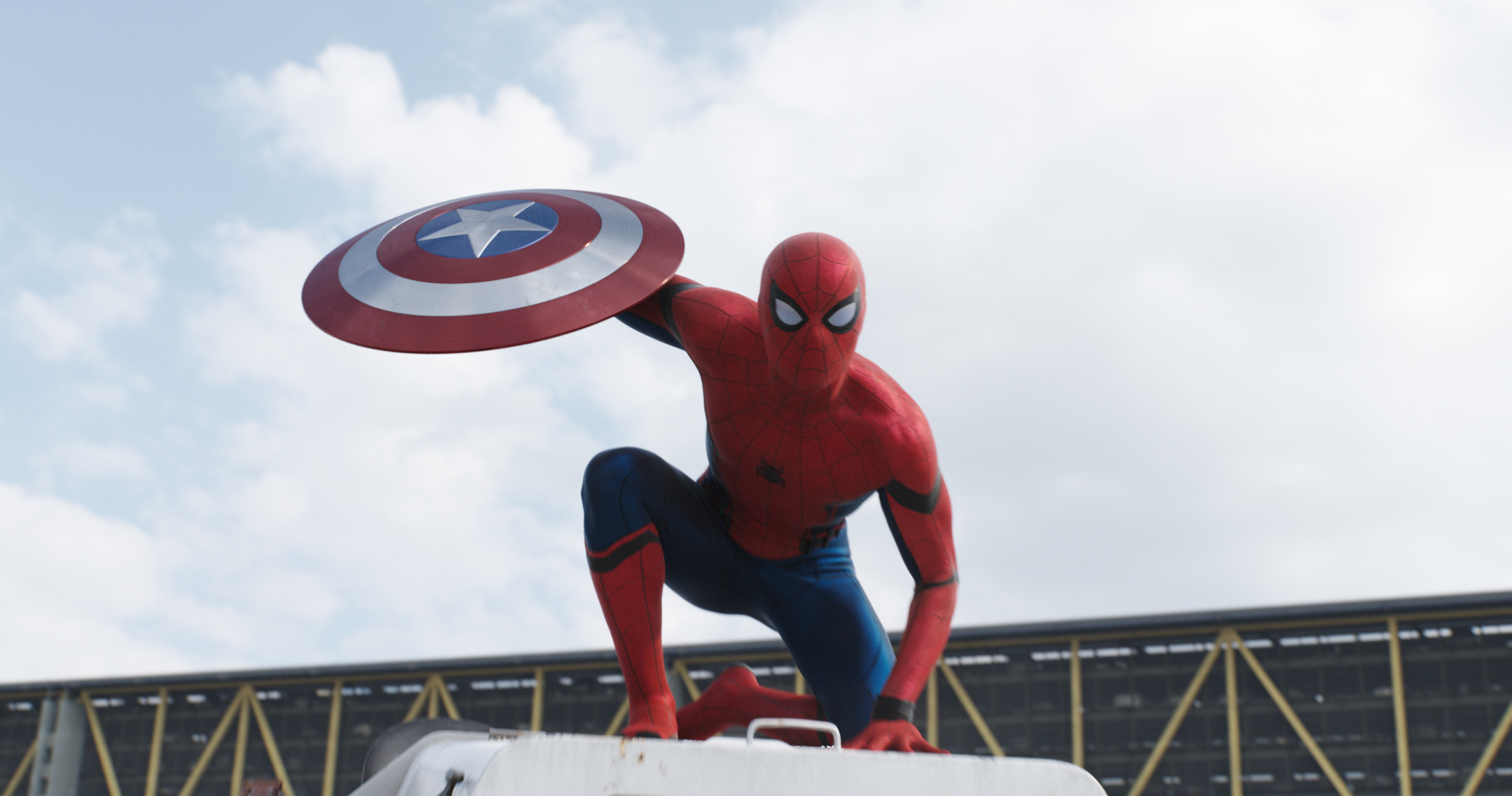
Spider-Man/Peter Parker (Tom Holland)
Photo Credit: Film Frame
© Marvel 2016
Joe: There was a really exhaustive audition process for that role. And you know we saw him for the first time in our office in Atlanta, it was Anthony and I. We were doing work sessions with all the actors. And he came in, and you know, Spider-Man was a very important character to me as a kid. I was a big comic book collector. I still have my collection in my closet to my wife’s dismay. And that character was my favorite character growing up. So to be able to interpret him on screen was like a dream come true. The things that I loved about him as a character when I was a kid were his vulnerability, his insecurity, his sense of humor. But I loved that his sense of humor in the books was a very self-aware. He was a smart ass kid, but he was a kid. And we felt that in our interpretation of the character, we wanted to have an actor very close in age to Peter Parker. And Tom’s a young actor. And we also wanted to make sure that the actor had both the vulnerability and confidence at the same time. It made him accessible. But also, would allow him to stand in contrast to all these other really experienced superheroes who are running around dealing with a very adult problem. And then you insert into that a kid who’s trying to improvise his way through the situation but doesn’t really understand the stakes and couldn’t understand the stakes because he’s a kid. And Tom Holland just embodied all of that. He brought a real authenticity. That was the other thing too is that we really wanted him to feel like he was of New York today, right now and not about comic book New York. He was a kid living in Queens who had a certain energy to him and that the shift in your personality that happens when you do live in New York City. That was everything we were looking for and the kid just embodied it so well, and he’s amazing in the film.
With your last film, you guys had wanted to do more like a 70s spy thriller. Was that your vision? What was your vision going into this one?
Anthony: On this one? You can’t do a movie called Captain America without sort of thinking about the politics of it, okay? It’s at the center of the character, who the character is from as inception and obviously in his name. So while there is still elements of the political thriller that carries us forward and kind of maybe even launches us into this movie, we always thought about this movie as a psychological thriller. And that shift was very important to us because you know the heart of this movie for us is the relationship and the conflict between Captain America you know Bucky Barnes and Tony Stark. It’s what has to play out between those three characters in the climax of the film that we are driving towards as storytellers for the whole movie. I mean, we are setting up that sort of awful reveal and that awful tension that plays out between those characters at that moment. So that’s why we always thought of it as a psychological thriller in terms of what happens to these characters on a psychological and emotional level when this horrible revelation comes through at the end of the film. Like, one of the movies we talked about a lot was David Fincher’s Seven. We talked about Brian de Palma’s Blowout a lot. It’s like, these are movies that have had this similar trajectory where the characters are on this sort of road to something very awful. And what is going to happen to them when they get there? How are they going to react as characters? How are they going to weather it as characters? So that was the heart of the film for us this time around.
There are so many fans that are loyal to these comic books, how are you able to translate part of that story in keeping with the comic books and then deciding to deter from that?

Joe: Well, as comic book fans ourselves, and I was a huge comic book fan, I don’t have a lot of interest, and I’m the first guy to line up to see the midnight showing of a movie I’m excited about. And I’ll drag my son out with me and sit there till 2:30 in the morning and watch the film just because I want to have that immediate response to the movie the same way that everybody wants to be part of the cultural conversation about that movie. As a diehard comic book fan, I’m not interested in seeing a straight interpretation of a comic book. I already know the story from the comic books. So why would I see the movie? In the Marvel cinematic universe is also building its characters in a very specific way that is very different than comic books. Film is a very different medium than comic books. We have two hours, 2 ½ hours to tell a story. And we can only put out one of those movies every one to two years to move these characters forward. So we have to make choices that are servicing the storytelling that is built up in the Marvel cinematic universe. And so Civil War in the Marvel cinematic universe is very different than Civil War in the comic books. We don’t So for us, we borrowed the concept and applied it to our characters. But we also needed what we felt was a very emotional reason that would drive the story on both sides because again we were really committed to making sure that when he got to the end, he had a very difficult time deciding who was right.
What was the hardest scene to shoot? And what was the most bad ass scene to shoot?
Anthony: Oh, that’s a good question. It’s hard to answer…
Joe: Very important question.
Anthony: Very. There’re different things, and it depends on what you’re focusing on at any given moment. I mean, look, these actors are also good, right? They’re easy to direct; they’re amazing actors. So like getting the emotional stuff like the performance stuff out of them is easy. Yeah, the execution of action though is very, very hard. And we are action fetishists we always say. So we love action. And we use action very specifically to find ways to express character and express narrative through action. So, that airport scene was about the biggest thing we’ve ever attempted to do. It was almost like a mini-movie within the movie. It took months and months and months to prepare that sequence. It took us an extremely long time to execute that sequence. And that sequence was built in many different ways. There’s some practical shooting we did at a location in Germany called Leipzig at an actual airport there. We had to build a huge what they call a back lot outside our studio in Atlanta where we just put down an enormous slab of concrete, surrounded it with green screen. Some of those characters are really physically there and are highly trained to do very difficult stunts with the stunt team as well. And then some of those characters are entirely CG. So they’re interacting in the fight.
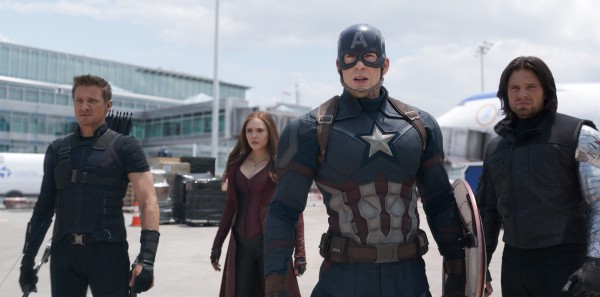
Joe: Plus it was so hot, 110° in Atlanta. We would take the temperature of the asphalt we were standing on, and it was close to 125. Guys like Chris Evans and Chadwick Boseman in full costumes standing out there. Poor Paul Bettany, I remember one day where he was hanging on wires out there in full vision outfit. And he moved his arm in a way that like the, his sleeve opened up and sweat just squirted out.
Anthony: They were just dissolving in front of your eyes.
Joe: So certainly uncomfortable circumstances but yeah, they’re very difficult sequences to shoot. Most bad ass is probably…
Anthony: The Romania sequence. It was really thrilling to be in that tunnel. We love cars like we love car chases. The moment where Winter Soldier grabs the motorcycle…Also, we love fighting. We like hand-to-hand fighting which is what we you know really what we focused on in the Winter Soldier with Captain America. So to bring him forward and have a fight with him and Bucky Barnes fighting their way out of the apartment through the stairwell, that was you know another thing that’s very bad ass for us you know.
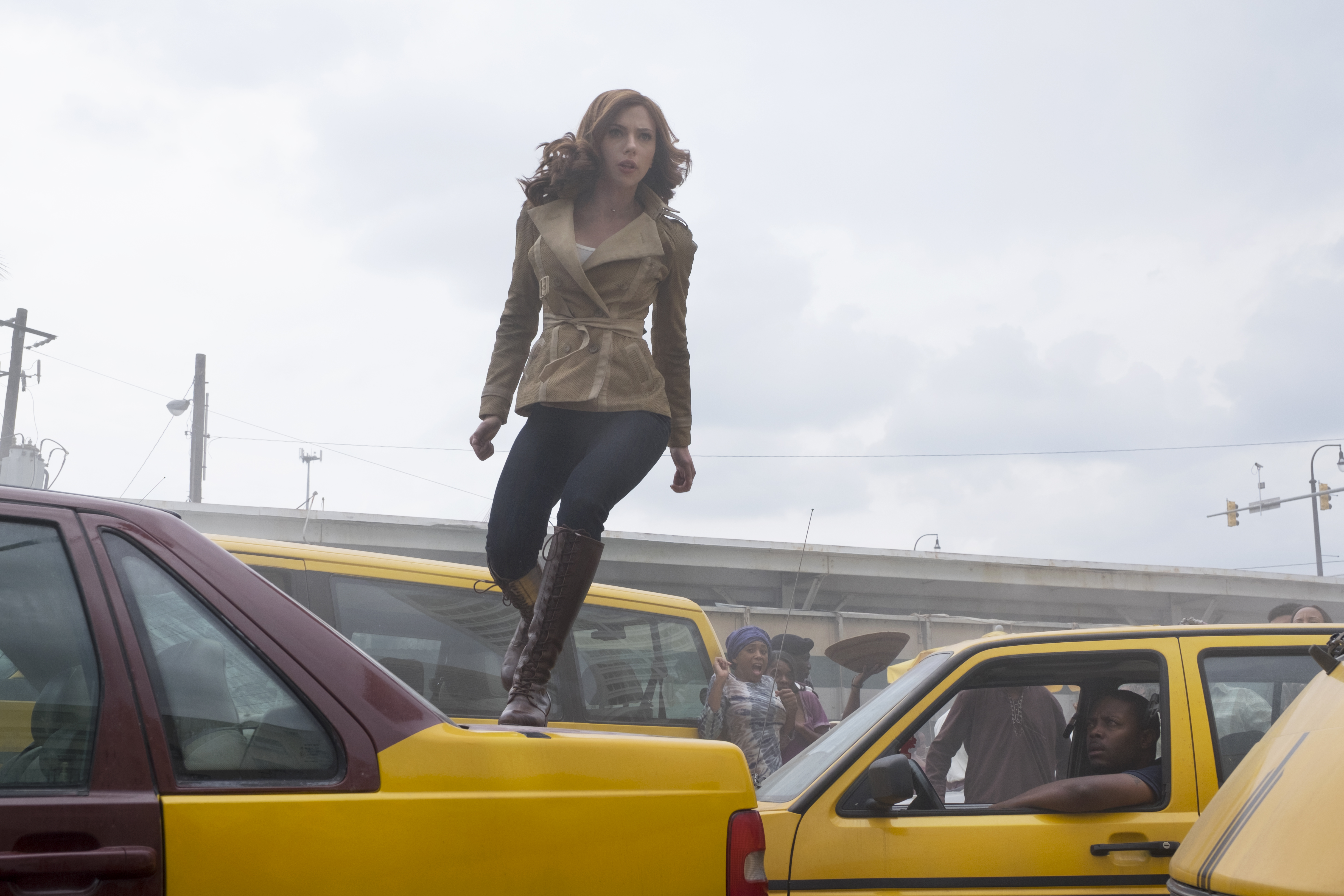
Joe: Natasha’s fights.
Anthony: Yeah. Natasha’s amazing. I mean, you know Scarlett is an amazing actor. And there’s a wonderful stunt woman that works with her and that’s called Heidi Moneymaker and she’s just an amazing fighter.
Joe: She really embodies that character and allows us to do some of those really bad ass Natasha sequences.
The love story between Captain and 13, are you looking forward to furthering that and sharing more of that with the audience?
Joe: Yeah. We’re sitting down and breaking into new War stories now and might be the next time that you see a lot of these characters on screen. So everything’s in the conversation. Where do these characters go? Where do we want them to be? You know, the interesting thing about Civil War for us is and the fact that we knew we were going to be doing The Infinity War films as we were –, there’s really a connection between the Winter Soldier, Civil War, and the Infinity War Movies. It’s an arch, and that arch is of this family. And this movie, it’s a downbeat in this family’s existence in the Avengers. And what we thought would be most interesting heading into infinity war would be putting these characters in the most complicated position they could possibly be in to face the greatest threat that they’re ever going to face. Can they pull together? Can they forgive each other? Will they forgive each other? Should they forgive each other? Can they ever work together again? And so I think you’ll see some fracturing as we move forward this This Civil War isn’t over. And it’s certainly going to carry forward. In the fracturing you will see you know, characters you know, camps of characters dealing with each other and moving forward. And certainly will be you know Captain and Agent 13 will be part of that.
CAPTAIN AMERICA: CIVIL WAR (5/6/16)
| Facebook | Twitter | Instagram | YouTube | Marvel |
* I was invited by Disney to attended the Captain America Event to share my experience with my readers. All opinions are my own.
- You Have to Remember – 9/11, 20 Years Later - September 11, 2021
- Creating the Perfect Look with a Maxi Dress - October 20, 2020
- Brand Better Giveaway - October 6, 2020


Leave a Reply